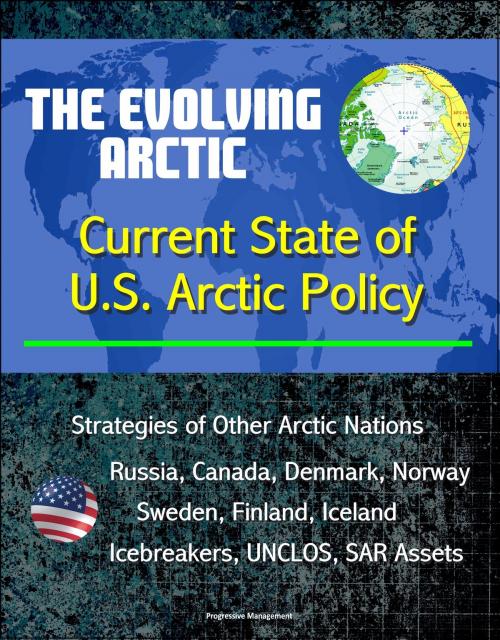The Evolving Arctic: Current State of U.S. Arctic Policy - Strategies of Other Arctic Nations, Russia, Canada, Denmark, Norway, Sweden, Finland, Iceland, Icebreakers, UNCLOS, SAR Assets
Nonfiction, History, Polar Regions| Author: | Progressive Management | ISBN: | 9781310223020 |
| Publisher: | Progressive Management | Publication: | November 18, 2014 |
| Imprint: | Smashwords Edition | Language: | English |
| Author: | Progressive Management |
| ISBN: | 9781310223020 |
| Publisher: | Progressive Management |
| Publication: | November 18, 2014 |
| Imprint: | Smashwords Edition |
| Language: | English |
The Arctic environment is in a state of flux and the U.S. government must be prepared to handle the evolution and capitalize on the opportunities. Once barren and desolate, the Arctic is slowly coming to life with industry and commerce brought about by receding ice conditions. Along with that comes the need for a comprehensive and actionable Arctic policy. The other Arctic nations that ring the North Pole are quickly adapting to the shifting Arctic. Unlike the U.S., they have established Arctic policies, are implementing plans to operate in the region, and taking advantage of the opportunities that this new frontier has to offer.
The U.S. framework is the National Strategy for the Arctic Region. The plan is short on detail and aspirational in nature. It lacks clear direction and authority. The U.S. has yet to commit to its role as an Arctic nation. The U.S. Arctic lacks infrastructure such as a deep-water port, a joint military base, and additional heavy icebreaker assets. Additionally, there is no lead agency that has authority and funding to carry out U.S. Arctic objectives. Under the current state of affairs, the U.S. is vulnerable to security, economic, and sovereignty issues in the Arctic.
CHAPTER I * INTRODUCTION * A. RESEARCH QUESTION * B. PROBLEM SPACE * C. THESIS ROADMAP * D. METHOD * E. LITERATURE REVIEW * CHAPTER II * ASSEMBLING THE EVIDENCE - REVIEW OF CURRENT U.S. ARCTIC FRAMEWORK * A. U.S. HAS AN ARCTIC "WISH LIST" (NOT POLICY) * 1. The U.S. is Not a Signatory to the U.N. Convention on the Law of the Sea (UNCLOS) * 2. The U.S. is an Active Member of the Arctic Council * CHAPTER III * CONSTRUCT THE ALTERNATIVES: THE OTHER NATIONS' ARCTIC STRATEGIES * A. CANADA * 1. Exercising Arctic Sovereignty * 2. Sovereignty and Increased Military Presence * 3. Arctic Council * 4. International Cooperation * 5. Protecting the Nation's Environmental Heritage * 6. Promoting Social and Economic Development * 7. Indigenous Relations * 8. Improving and Devolving Northern Governance * 9. Summary and Analysis * B. RUSSIAN FEDERATION * 1. Military Presence to Promote Security * 2. UNCLOS * 3. Arctic Council * 4. Economic and Natural Resource Development * 5. Summary and Analysis * C. KINGDOM OF DENMARK * 1. Sovereignty and Security * 2. Respectful Development of Resources and Environmental Protection * 3. International Cooperation (UNCLOS and the Arctic Council) * 4. Summary and Analysis * D. NORWAY * 1. UNCLOS and International Cooperation * 2. Role of the Arctic Counsel in Norway * 3. Summary and Analysis * E. SWEDEN * 1. International Cooperation * 2. Indigenous People * 3. Climate Monitoring * 4. Marine Transportation * 5. Summary and Analysis * F. FINLAND * 1. Environment and Climate * 2. Economic Activities * 3. Transport/Infrastructure * 4. Treatment of Indigenous People of the Arctic * 5. Regional and International Cooperation * 6. Arctic Council * 7. Summary and Analysis * G. ICELAND * 1. UNCLOS * 2. Arctic Council * 3. Upholding Security Interests * 4. Indigenous People * 5. Summary and Analysis * H. NON-ARCTIC STATES * CHAPTER IV * SELECT THE CRITERIA - WHAT ARE THE GAPS IN THE CURRENT FRAMEWORK WHEN COMPARED WITH ALTERNATIVES?. * 1. Long-Term Maritime Governance * 2. Native Population Needs * 3. Infrastructure Development * CHAPTER V * PROJECT THE OUTCOMES AND CONFRONT THE TRADE-OFFS - THE RISKS IN THE MARITIME DOMAIN IF THE U.S. DOES NOT CREATE AN EFFECTIVE ARCTIC POLICY * A. RISK TO SAFETY OF LIFE AND PROPERTY AT SEA DUE TO A LACK OF SEARCH AND RESCUE (SAR) ASSETS AND FACILITIES * 1. Potential Environmental Damage, and Interruption of Native Subsistence Whaling/Fishing Due to a Lack of Oil Spill-Response Equipment * 2. Risk To Sovereignty/ Natural Resource Claims Due to Not Acceding to UNCLOS * 3. Maritime Domain Awareness as a Means of Increasing
The Arctic environment is in a state of flux and the U.S. government must be prepared to handle the evolution and capitalize on the opportunities. Once barren and desolate, the Arctic is slowly coming to life with industry and commerce brought about by receding ice conditions. Along with that comes the need for a comprehensive and actionable Arctic policy. The other Arctic nations that ring the North Pole are quickly adapting to the shifting Arctic. Unlike the U.S., they have established Arctic policies, are implementing plans to operate in the region, and taking advantage of the opportunities that this new frontier has to offer.
The U.S. framework is the National Strategy for the Arctic Region. The plan is short on detail and aspirational in nature. It lacks clear direction and authority. The U.S. has yet to commit to its role as an Arctic nation. The U.S. Arctic lacks infrastructure such as a deep-water port, a joint military base, and additional heavy icebreaker assets. Additionally, there is no lead agency that has authority and funding to carry out U.S. Arctic objectives. Under the current state of affairs, the U.S. is vulnerable to security, economic, and sovereignty issues in the Arctic.
CHAPTER I * INTRODUCTION * A. RESEARCH QUESTION * B. PROBLEM SPACE * C. THESIS ROADMAP * D. METHOD * E. LITERATURE REVIEW * CHAPTER II * ASSEMBLING THE EVIDENCE - REVIEW OF CURRENT U.S. ARCTIC FRAMEWORK * A. U.S. HAS AN ARCTIC "WISH LIST" (NOT POLICY) * 1. The U.S. is Not a Signatory to the U.N. Convention on the Law of the Sea (UNCLOS) * 2. The U.S. is an Active Member of the Arctic Council * CHAPTER III * CONSTRUCT THE ALTERNATIVES: THE OTHER NATIONS' ARCTIC STRATEGIES * A. CANADA * 1. Exercising Arctic Sovereignty * 2. Sovereignty and Increased Military Presence * 3. Arctic Council * 4. International Cooperation * 5. Protecting the Nation's Environmental Heritage * 6. Promoting Social and Economic Development * 7. Indigenous Relations * 8. Improving and Devolving Northern Governance * 9. Summary and Analysis * B. RUSSIAN FEDERATION * 1. Military Presence to Promote Security * 2. UNCLOS * 3. Arctic Council * 4. Economic and Natural Resource Development * 5. Summary and Analysis * C. KINGDOM OF DENMARK * 1. Sovereignty and Security * 2. Respectful Development of Resources and Environmental Protection * 3. International Cooperation (UNCLOS and the Arctic Council) * 4. Summary and Analysis * D. NORWAY * 1. UNCLOS and International Cooperation * 2. Role of the Arctic Counsel in Norway * 3. Summary and Analysis * E. SWEDEN * 1. International Cooperation * 2. Indigenous People * 3. Climate Monitoring * 4. Marine Transportation * 5. Summary and Analysis * F. FINLAND * 1. Environment and Climate * 2. Economic Activities * 3. Transport/Infrastructure * 4. Treatment of Indigenous People of the Arctic * 5. Regional and International Cooperation * 6. Arctic Council * 7. Summary and Analysis * G. ICELAND * 1. UNCLOS * 2. Arctic Council * 3. Upholding Security Interests * 4. Indigenous People * 5. Summary and Analysis * H. NON-ARCTIC STATES * CHAPTER IV * SELECT THE CRITERIA - WHAT ARE THE GAPS IN THE CURRENT FRAMEWORK WHEN COMPARED WITH ALTERNATIVES?. * 1. Long-Term Maritime Governance * 2. Native Population Needs * 3. Infrastructure Development * CHAPTER V * PROJECT THE OUTCOMES AND CONFRONT THE TRADE-OFFS - THE RISKS IN THE MARITIME DOMAIN IF THE U.S. DOES NOT CREATE AN EFFECTIVE ARCTIC POLICY * A. RISK TO SAFETY OF LIFE AND PROPERTY AT SEA DUE TO A LACK OF SEARCH AND RESCUE (SAR) ASSETS AND FACILITIES * 1. Potential Environmental Damage, and Interruption of Native Subsistence Whaling/Fishing Due to a Lack of Oil Spill-Response Equipment * 2. Risk To Sovereignty/ Natural Resource Claims Due to Not Acceding to UNCLOS * 3. Maritime Domain Awareness as a Means of Increasing















